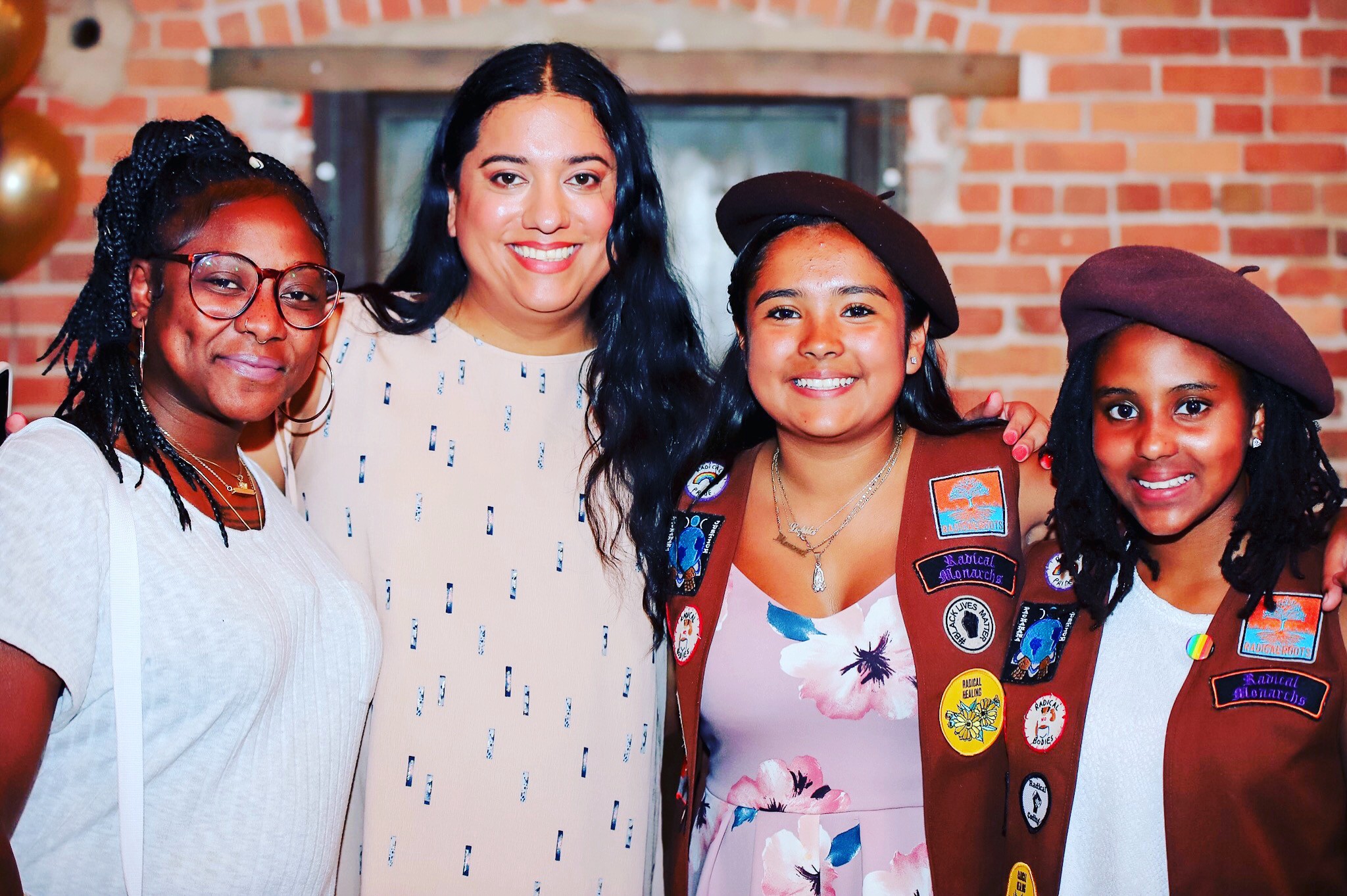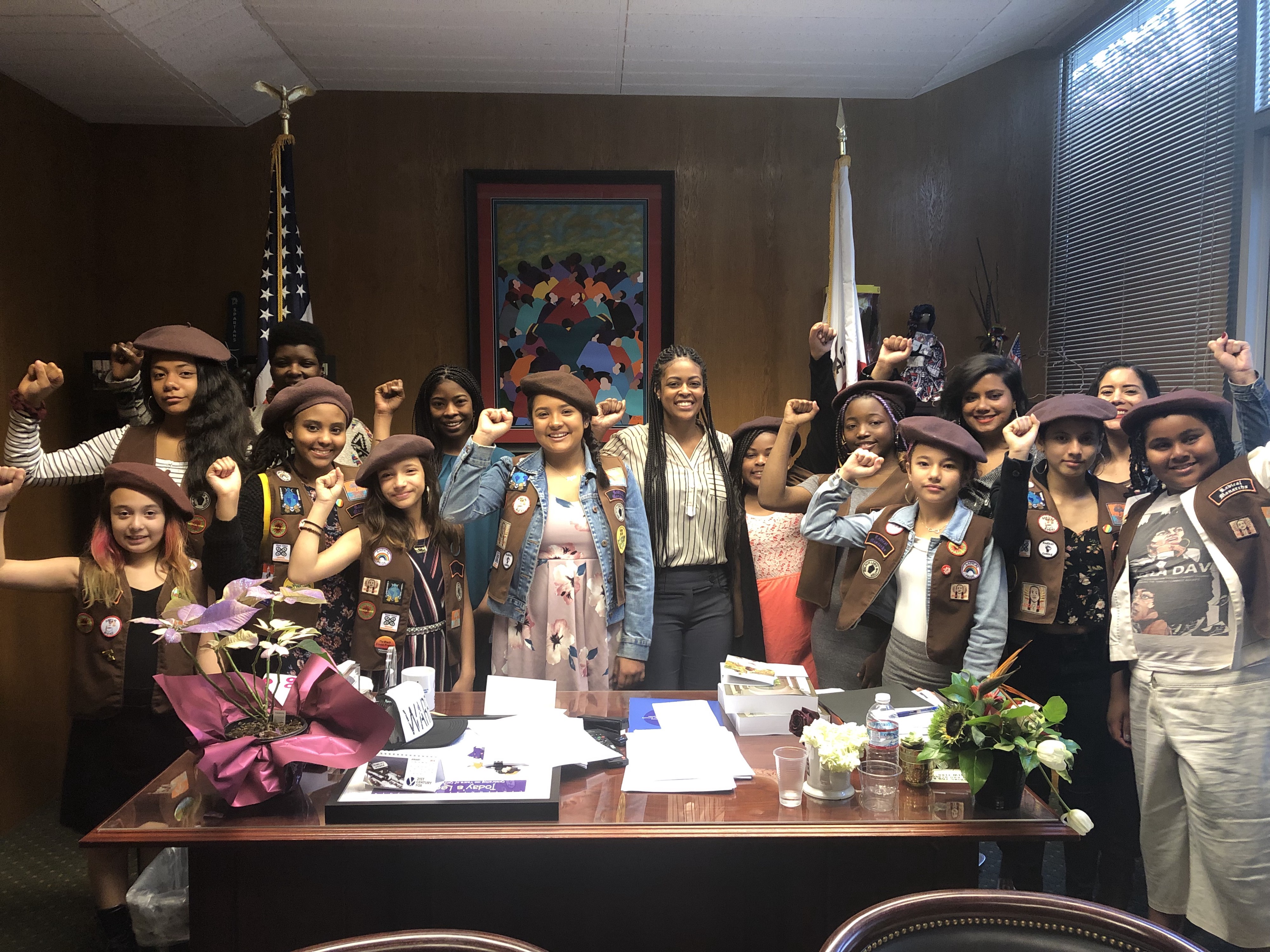Above Photo: The Radical Monarchs at SFFILM Festival. Photos courtesy of Anayvette Martinez
The Radical Monarchs earn their badges by fighting for people of color
Anayvette Martinez wanted to start a different kind of girl scout troop after her then fourth-grade daughter expressed her desire to join one. What Martinez found, however, was that her daughter Lupita would have been one out of two Brown girls to join. She knew this statistic had to change.
“The traditional scouting model wouldn’t center her experience as a woman of color, and it would have been a watered-down version of what she could be exposed to,” says Martinez (who identifies herself as Queer) of the idea of starting the Radical Monarchs. She wanted the troop to truly center women of color’s identity.
While the political climate has drastically changed since the Radical Monarchs were founded in 2014, the organization’s mission has not. The Monarchs have continued to create a space for young women of color to develop not only a sisterhood, but also a sense of purpose in navigating what goes on politically and with social justice efforts that affect their local community in Oakland.
“The traditional scouting model wouldn’t center [my daughter’s] experience as a woman of color, and it would have been a watered-down version of what she could be exposed to.”
“My daughter Lupita has been raised in a very politically conscious family. She’s attended marches since before she could talk,” says Anayvette Martinez, founder of the Monarchs. “We have openly talked about social justice and political issues in our home.” When Martinez brought up this idea to her daughter, Lupita was all on board. Martinez, who has a background working in youth development, knew her plan was not outrageous. To the contrary, creating an organization developed around the women-of-color experience was needed in the changing landscape of the Bay Area. Even before the idea was set in stone, Lupita was busy recruiting potential scouts among her friends.
Martinez knew she could not develop the Radical Monarchs on her own. She needed an equally passionate individual who was committed to social justice. Martinez also knew she had to look no further than her best friend, Marilyn Hollinquest. The Radical Monarchs officially launched in December 2014. “We never imagined it was going to be this big thing. We thought it was just going to be something that we were doing for Lupita and her friends,” Martinez recalls.
The buzz was such that the forming of the organization landed them on Fox News, where anchors accused Martinez and Hollinquest of “indoctrinating these young girls.” While the Monarchs learn about coding, environmental and disability justice, consent, and many other pressing issues, in other parts of the country, like Texas, a young boy was selling hot chocolate to raise funds to “build the wall.”
The critical response from Fox News anchors and political commentators did not derail the mission. In fact, producer and director Linda Goldstein Knowlton reached out to Martinez and Hollinquest to ask if her film crew could follow along with the organization’s development. The three-year project turned into a documentary, We Are the Radical Monarchs, which premiered this March at the SXSW Festival in Austin, Texas. It will also be part of this year’s Traverse City Film Festival, July 30 to August 4.
During their three-year journey with the filmmakers, Martinez and Hollinquest went through what it was like to hold down a regular nine-to-five job, care for a growing family, and endure the trials and tribulations in making the Radical Monarchs thrive with little to almost no funding. “The first three years definitely took its toll. We both hit a breaking point,” says Martinez of the difficulties they faced in building the organization from the ground up. “It was becoming completely unsustainable,” she adds.
After the second year with limited funding, their work paid off. The organization is currently on a multiyear grant that has allowed Martinez and Hollinquest to quit their jobs and turn their work with the Radical Monarchs into a full-time commitment, at a time when a strong social justice movement among young kids is needed more than ever.
The Monarchs are a constant fixture at the California State Capitol, where they often meet with legislators. They are also known for being speakers at Oakland’s city council meetings.
“We definitely incorporate what is happening politically right now in our moment to our program,” Martinez says. The Monarchs are a constant fixture at the California State Capitol, where they often meet with legislators. They are also known for being speakers at Oakland’s city council meetings, where they raise their voices in support of keeping the city of Oakland as a sanctuary city.
“When Trump was elected, we had a meeting with the Monarchs to see how they were feeling, if they had any questions, and what we wanted to do about it,” says Martinez of the 2016 presidential election. “One of the most important elements of our program is action.” For Martinez, it is essential to create space where the Monarchs can process what is happening in the country, especially around the issue of immigration.
While being politically aware, the girls address other areas tied to the government where the Monarchs learn and create. This is where the badges they earn come into play. The Radical Body badge teaches these young women about consent and how to protect themselves — which in the #MeToo era is urgently needed. The Pacha Mama badge not only teaches them environmental justice, but also encourages them to participate in community cleanups. Most badges take three to five months to earn. So far, the organization has developed 12 badges.
The Radical Monarchs are slowly expanding. Currently, the troops are only in Bay Area cities such as Oakland, Richmond, San Francisco, and Berkeley. The organization intends to roll out troops statewide and nationally.
For Martinez, it is a pivotal moment to get young kids involved in what is happening around the world and, most important, engaged in the day-to-day pressing issues in their communities. “Social movements have been more adult-centered, and if there is a youth element, it’s usually older youth,” Martinez says. “We need to start having these conversations when young people are younger and call out what is not equitable and just.”




